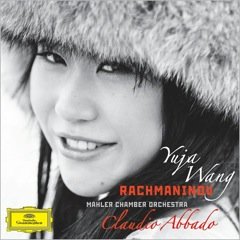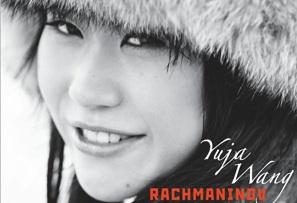
A single example of the magic of Yuja Wang’s new Rachmaninov recording tells everything you need to know: See track 13, below.
It is “Variation XI: Moderato” of the 1934 Rhapsody on a Theme of Paganini, music lasting a little over one minute. But what you hear is independent of time. It is music that lives in itself, overcomes the listener — the kind of experience John Donne has described as one that imprisons, enthralls, ravishes ...
And here is a little personal quirk that makes this gushing more meaningful: I am not a great Rachmaninov fan, in general, and not a fan of the Rhapsody, in specific. But Yuja’s is a performance that makes such individual preferences meaningless. Anchored in the regal security of Claudio Abbado’s Mahler Chamber Orchestra, Yuja makes the individual notes cascade like pearls, stretches the space between them just at the edge of what is perceptible, and “sings” with a legato that’s the domain of only masters of lieder.
Listen To The Music
Rhapsody on a Theme of PaganiniVariation XI. Moderato
Concerto for Piano and Orchestra No. 2
in C minor, II Adagio sostenuto (excerpt)
In this, her first orchestral recording — following recital CDs of Sonatas and Etudes and Transformation — the 23-year-old offers Rhapsody and the Rachmaninov Second Piano Concerto. During her current tour, which ends with San Francisco Symphony performances June 16-19, of the Bartók Piano Concerto No. 2, she is crisscrossing the country with a varied repertory, not only Rachmaninov.
The ethereal quality of Variation XI is at play with the gravity of the “Dies Irae” quotes, the meandering repetitions, the heroic and haunting aspects of other pieces. Just as you’d expect, the most famous variation — “XVIII: Andante cantabile” (Track 20) — is dreamy and meltingly lyrical, yet kept within the discipline and good taste that’s the hallmark of both conductor and pianist.
Yuja, however, emphasizes another aspect of the relationship to the music: “It’s a red-hot work — it suits young people my age because it’s so emotional.”
Still, it is in the 1901 Second Piano Concerto, in C minor, Op. 18, that the intensity is even more palpable. The live recording, made in Ferrara’s Teatro Communale, has a sound of immediacy, free of studio overengineering. Yuja’s exceptional strength is put to good use for the introductory tolling of the bells that builds tension heralding the appearance of the main theme. Her arpeggios are full and strong. Abbado and the orchestra are leaders, followers — partners in music-making of the highest order.
For the Adagio and Allegro, so often overdone (and thus creating some less-than-enthusiastic Rachmaninov fans), there is balance here and the right sound between excess and holding back too much. The Italian maestro and the Chinese-American pianist get the Russian essence of the composer for a big, resounding “DA!”

